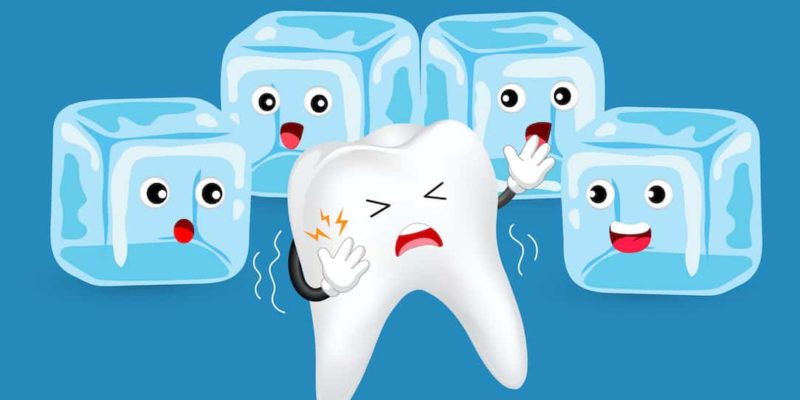How to Fight Tooth Sensitivity at Home

Having sensitive teeth means you might have to avoid your favorite foods and drinks. When you have tooth sensitivity, you are more likely to experience pain when you eat hot or cold foods and drinks, even sweet ones too. If you find yourself fighting sensitivity, here is what you can do at home to beat the pain.
What is Tooth Sensitivity?
Tooth sensitivity is a common dental health issue that happens when discomfort or pain in teeth when encountering different substances and temperatures. Live Science explains that the pain is sharp, and often sudden, but is usually temporary. They explain that the most common symptom is a sudden, sharp flash of pain when the teeth become exposed to air, cold, sweet, acidic, or hot foods.
When the teeth are healthy, the enamel protects the inner layer of the tooth, which is known as the dentin and the tooth roots are protected by gums. However, when the enamel wears down or when the gums recede, the dentin and roots are exposed which can cause sensitive teeth. Healthline details the most common triggers of tooth sensitivity to be:
- Hot food and drinks
- Cold food and drinks
- Chilly air
- Sweet food and drinks
- Acidic food and drinks
- Cold water
- Brushing or flossing
- Alcohol-based mouth rinses
Causes of Tooth Sensitivity
Tooth sensitivity can happen as a result of a few different causes. While some people might be more genetically prone to sensitive teeth, others might bring on their tooth sensitivity all on their own. Healthline details what can wear down the tooth’s enamel and cause sensitivity:
- Brushing your teeth too hard
- Using a hard-bristled toothbrush
- Grinding your teeth at night
- Regularly eating or drinking acidic foods and beverages
Alternatively, other conditions can cause tooth sensitivity. They explain that gastroesophageal reflux (GERD) can cause acid to come up from the stomach and can wear down teeth over time. Additionally, conditions that cause frequent vomiting can also wear down the enamel.
Another reason a person might experience sensitivity is if they are currently experiencing gum recession, tooth decay, or have a broken or chipped tooth. When a tooth becomes exposed at the root or the enamel wears down, sensitivity can happen. When these conditions happen, you will most likely only experience the sensitivity near one tooth, not throughout your whole mouth.
If you get dental work done, like receive a filling, get a crown, or undergo a teeth whitening treatment, you might also experience tooth sensitivity. This typically goes away in a couple of days.
Treating Sensitivity at Home
If you suffer from tooth sensitivity, you can usually treat the uncomfortable symptoms at home. Try these tips next time you feel a little sensitivity coming on:
Switch to a sensitive toothpaste
If you’re feeling a little sensitivity on your teeth, start by trading out your usual toothpaste for one that is formulated specifically for sensitive teeth. This type of toothpaste works by helping coat your tooth and desensitizing the exposed parts of the nerve. Further, most of these toothpastes include fluoride, which helps toughen the enamel.
Use clove oil
Clove oil is a popular remedy to treating tooth pain. Colgate explains that clove oil works to relieve pain and reduce swelling. It works because it contains eugenol, which is considered a natural anesthetic, serving as a temporary pain reliever. To use clove oil, soak a few drops of clove oil into a cotton ball, then gently rub the cotton ball over the tender area of the mouth.
Rinse with salt water
Colgate further explains that rinsing your mouth with warm salt water can help control plaque on the teeth and prevent oral disease. All you have to do for this is mix a teaspoon or two of salt into a cup of warm water and then swish around in your mouth for a few seconds before spitting it out
See Dr. Ania
If you have tooth sensitivity that doesn’t go away when you try these at-home remedies, it could signal that there is a deeper issue causing your pain that needs to be addressed. Dr. Ania will examine your mouth to determine the cause and provide you with a treatment plan that will help work to relieve your sensitivity. Dentists can prescribe you with a desensitizing toothpaste, fluoride gel, or provide you with treatments like a crown or root canal to heal your injured tooth.
To get rid of tooth sensitivity, make an appointment with Dr. Ania today by calling our office at (303)-872-9940.


